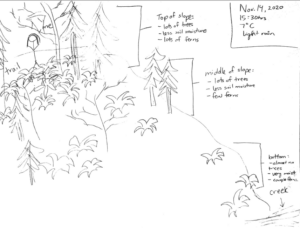User: | Open Learning Faculty Member:
I visited the ravine again on November 14th at around 15:30 hrs. It was a cloudy day again with some light rain and a temperature of 7°C. I decided to focus my observations on the ferns this time and also chose the slope as my environmental gradient. From my research, I was able to identify the species of ferns as Polystichum munitum, or the western sword fern. I also took a different route at the top of the ravine to get a different view and to see if I still noticed the pattern of the ferns being more abundant higher up and away from the creek.
At some points along the trail, there was not a noticeable difference in the abundance along the slope. However, at many areas, I could see that were many more ferns at the top compared to the bottom. I was able to confirm the pattern I saw last time. I stopped at one point along the trail and chose three locations on the slope to study the ferns: at the bottom right by the creek, halfway up the slope, and then near the top of the slope.
Bottom of slope: very moist soil, not many trees, only 3 ferns
Middle of slope: soil a little less moist than bottom, lots of trees, maybe 5-7 ferns
Top of slope: soil a little moist, lots of trees, lots of ferns
There could be many possible reasons to explain this pattern including, soil moisture or water content and sunlight exposure. I know ferns tend to grow in damp, shaded areas, so moisture and sunlight exposure are definitely factors that I can explore as possible reasons for my hypothesis.
Based on my observations I have come up with a hypothesis, prediction, response variable, and explanatory variable.
Hypothesis: Creek proximity affects Polystichum munitum abundance.
Prediction: As distance from the creek increases, Polystichum munitum abundance increases.
Response Variable: Fern abundance (continuous)
Explanatory Variable: Distance from the creek (continuous)


For your hypothesis is creek proximity your process or is it soil moisture, shade, and or slope steepness which vary with proximity to the creek?
I think I will use soil moisture as my process. So in that case:
Hypothesis: Soil moisture along a slope affects Polystichum munitum abundance
Prediction: As soil moisture increases, Polystichum munitum abundance decreases.
Response Variable: Fern abundance (continuous)
Explanatory Variable: soil moisture level (continuous)
I would appreciate any feedback on my revised hypothesis!